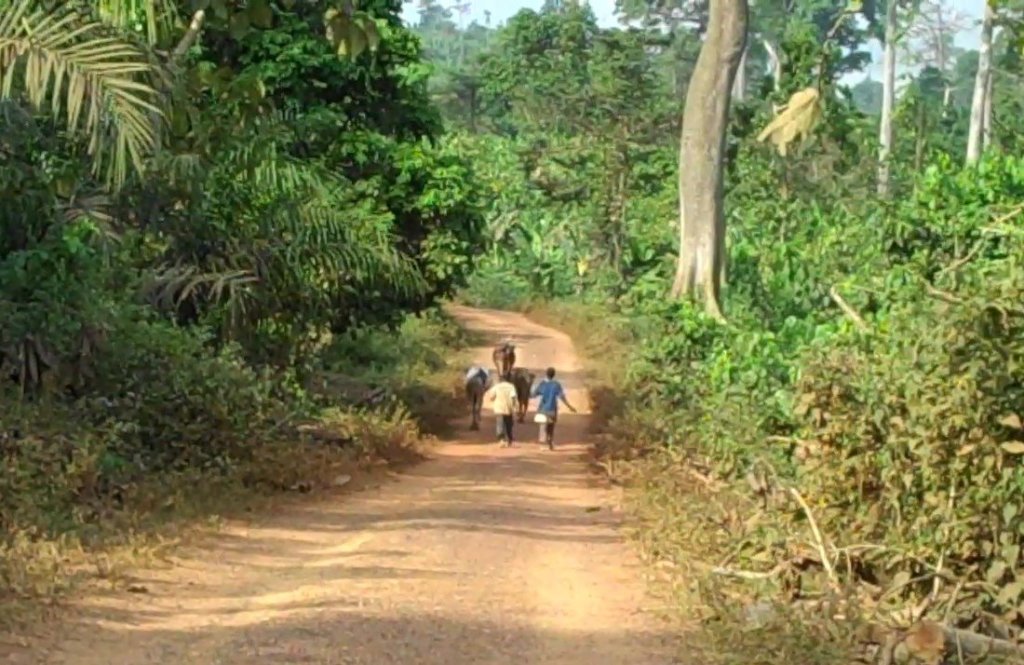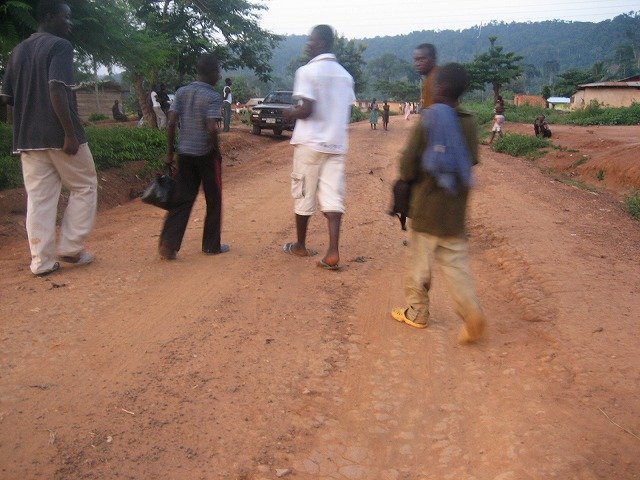By Tomoko Shiroki | Managing Director / Co-founder of ACE
In the cocoa producing area of Ghana where ACE conducts projects, there are many migrant workers. They come from northern Ghana as well as from foreign countries, such as Burkina Faso, Togo, and Mali to look for work.
Among such migrant populations, there are cases of “human trafficking”, with children separated from their parents and brought to cocoa farms as workers.
I would like to share with you one of ACE's experiences rescuing children suffering from human trafficking.
Here is the story of Emanuel and Stephan.
In January 2010, we encountered two children who were walking with about 10 cattle. It was in the afternoon, and the temperature outside exceeded 30 degrees. They said that they were walking all day under the scorching sun, and that they were starving. It is a very dangerous task for children to attempt to control animals much bigger than themselves, and they were at a high risk of being trampled or otherwise grievously injured by the cattle.
Their names were Emmanuelle (who was 11 years old) and Stephan (who was 14). They had left their parents who lived in Northern Ghana, and were brought to the Anglo village of Ashanti in Ghana. They lived there working for the peasant farmers who make their living through cacao production and pastoral farming. The employer's children were attending school, but Emmanuelle and Stephan were not allowed to go to school at all.
Children brought by human trafficking from the northern part of Ghana to the southern part where cacao grows:
Separating children from their parents and forcing them to work is human trafficking and is prohibited by both Ghanaian and international law. If children are found in forced labor circumstances, they have to be protected immediately. We wanted to save Emmanuelle and Stephan as soon as we encountered them, but it was much more difficult than we thought.
In order to actually protect them, many complicated judicial procedures were necessary, such as arresting the employer who was carrying out the illegal act of using child laborers acquired through trafficking, and put them in trial, and demand a court order. The judicial procedure to rescue Emmanuelle and Stephan did not go smoothly. Every time we visited them, we checked their safety, but sometimes we felt helpless not being able to rescue them immediately.
The moment when we resolved to save children from human trafficking:
In late May 2010, we visited them to check their situation. Emmanuelle and Stephan told us that their employer made a promise to their parents that Emanuel and Stephen could go to school there. Emmanuelle and Stephan also believed the employer’s promise, but in reality, they were not allowed to go to school, not even once.
They said that they were forced to carry the water barrels all day and were forced to prepare meals for the employer’s family. In the cacao harvest season, they were forced to work in the cocoa farms, climbing trees to drop cacao beans. They were threatened by the employer that "If you do not listen to what I say, there is nothing for you to eat."
When we ask, if there was anything they want to ask, Emmanuelle said;
"I want to get out of here right now, if that is possible."
We heard his desperate voice, and that strongly moved us. Despite it was the weekend, we asked the county governor, the social welfare department, the judicial bureau, and the police to rescue them urgently. Because of our enthusiasm, people cooperated, and finally we were able to rescue the two children.
After that, Emmanuelle and Stephan were able to receive doctor's check-ups and psychological counseling while living under the administration of the social welfare department of the county. In fact, we found that they had a number of diseases, and they were forced to work under severe condition while sick. We strongly regretted that we could not have rescued them earlier.
Things necessary to protect children in human trafficking
Later, with the cooperation of the social welfare department, we found where Emmanuelle and Stephan’s parents were. The north-eastern state of Northern Ghana, where their parents lived was so far away from the Ashanti state where ACE was conducting its project, and it was such a hard job to find where they were. We were so lucky that we found their family, and the children were able to reunite with their own family. Their parents didn’t know that Emmanuelle and Stephan were in the forced labor under inhumane conditions, and they cried when they found out about it.
In the Smile-Ghana Project, we are working to protect children from the suffering and abuse of human trafficking and to reunite with their families. In areas that ACE supports, we have found, protected and reunited several trafficked children.
The money we raise through this crowdfunding will also be used to support the education of children who suffer from human trafficking.
In order to protect children and return them to their families, it takes a lot of time and costs a lot of money. The donations that you make here will be used to educate children who have suffered from such trafficking.
We appreciate your kind support, and thank you for helping reach the day when all children can have safe lives, educational opportunities, and the love and protection of their families.
Project reports on GlobalGiving are posted directly to globalgiving.org by Project Leaders as they are completed, generally every 3-4 months. To protect the integrity of these documents, GlobalGiving does not alter them; therefore you may find some language or formatting issues.
If you donate to this project or have donated to this project, you can receive an email when this project posts a report. You can also subscribe for reports without donating.
Support this important cause by creating a personalized fundraising page.
Start a Fundraiser
